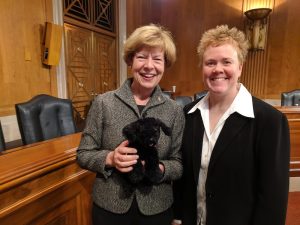Contact: Dr. Erika Washburn, 715-399-4085, erika.washburn@wisc.edu

Senator Tammy Balwin (left) and Erika Washburn, Director of the Lake Superior Reserve.
Dr. Erika Washburn, Director of the Lake Superior National Estuarine Research Reserve, part of the University of Wisconsin-Madison Division of Extension, testified May 16 before a congressional committee on climate science and the work performed by the Research Reserves and partners in service to the nation’s coastal communities.
Washburn’s testimony before the U.S. Senate Commerce, Science and Transportation Subcommittee on Science, Oceans, Fisheries and Weather offered examples of how coastal programs help communities through initiatives like the Reserves’ national monitoring program, which maintains 280 stations across the 29 sites in the Reserve system. Every 15 minutes, these stations take readings on water quality, pollution, habitat change, sea level rise and weather, produce more than 40 million, publicly available data points every year.
“The ability to predict and plan for these changes touches almost every aspect of life on the coast,” said Washburn. “It impacts infrastructure, property values, shipping, dredging, fisheries, tourism, public health, and quality of life over all.”
Chairman and Senator Cory Gardner along with Ranking Member Senator Tammy Baldwin invited Washburn to a hearing titled Atmospheric Science Research and Forecasting Innovation. The other three witnesses were Dr. Waleed Abdalati, Director, Cooperative Institute for Research in Environmental Sciences; Dr. Deborah Bronk, President and Chief Executive Officer, Bigelow Laboratory for Ocean Sciences; and Dr. Radley Horton, Associate Research Professor, Lamont-Doherty Earth Observatory, Columbia University Earth Institute.
The hearing’s purpose was to examine the current state of atmospheric and forecast research. The witnesses provided insight on how to make atmospheric science research more broadly accessible and available. The panel also provided feedback on the Weather Research and Forecasting Innovation Act of 2017 and the National Integrated Drought Information System Reauthorization Act of 2018.
“I’m grateful to Senator Baldwin for inviting me to testify,” said Washburn. “She knows how important understanding the changes in the Great Lakes is to the long-term health of our communities. It was a privilege to represent the science and outreach our programs do to help.”
Archived video of the testimony can be found at https://go.wisc.edu/1tm6ne.
###



